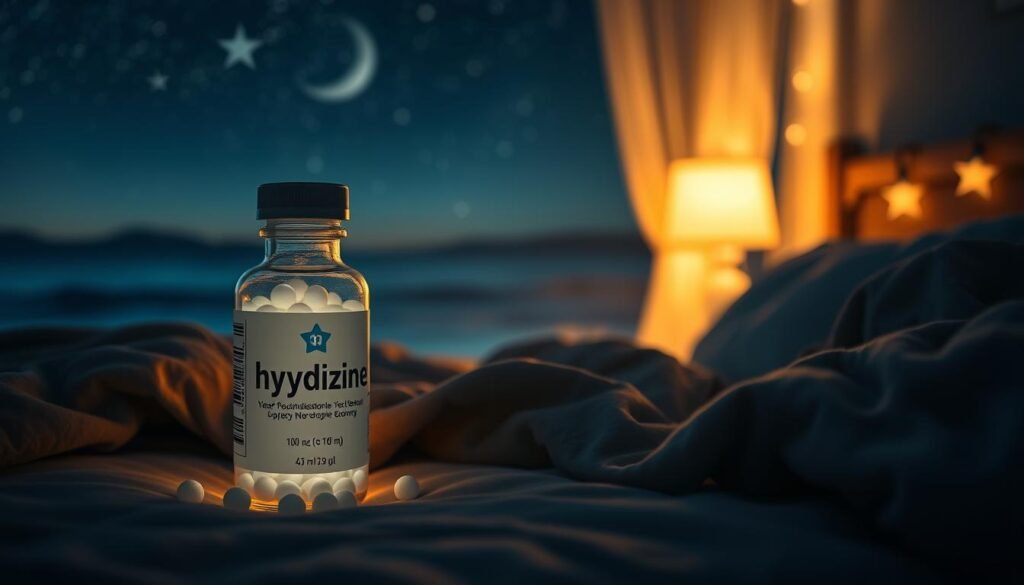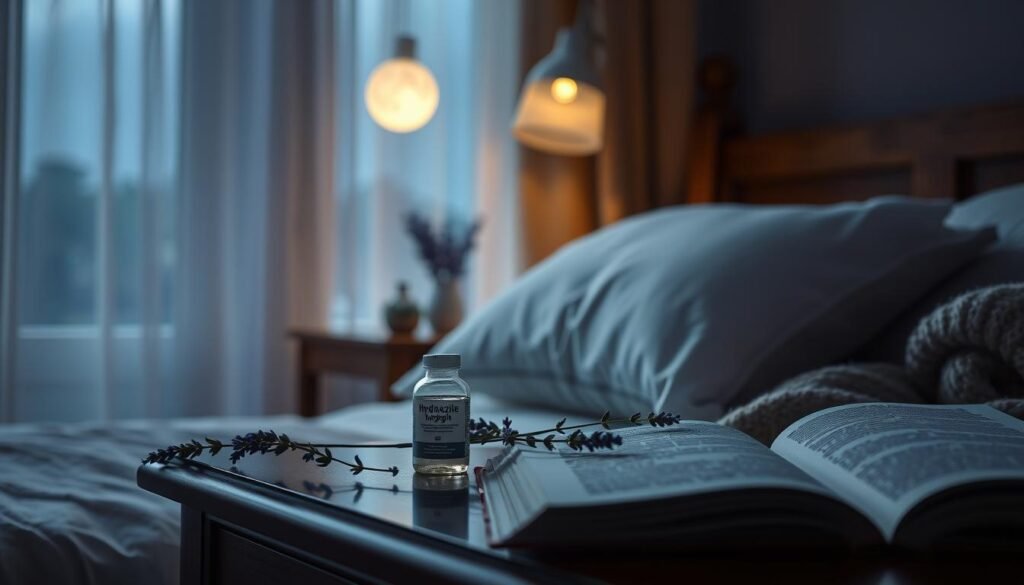Nearly 20 percent of adults find it hard to sleep, leading them to seek various treatments. Atarax, or hydroxyzine, has become a gentle aid for those needing sleep. Though not officially approved by the FDA for insomnia, its sedative effects offer a solution for sleepless nights. Initially, doctors prescribed it for anxiety and allergic reactions. But now, its use for insomnia due to its calming effects is getting noticed.
This medicine works as an antihistamine, tackling sleep problems, itching, and anxiety. It changes histamine and serotonin levels in the body. This helps people have more peaceful nights. For more insights into Atarax and how it helps with sleep issues, check out detailed info here.
Key Takeaways
- Atarax (hydroxyzine) is often prescribed off-label for insomnia relief.
- Approximately 20% of adults face sleep difficulties, making reliable treatments essential.
- Hydroxyzine functions by altering histamine and serotonin levels, promoting drowsiness.
- Short-term use of hydroxyzine is recommended to avoid reduced effectiveness and potential side effects.
- Understanding dosages and interactions is crucial for safe usage of this sleep aid.
Understanding Insomnia and Its Impact
Millions around the world cannot fall asleep easily, stay asleep, or wake up too early due to insomnia. This sleep issue makes more than 5.5 million people visit family doctors each year. Those with insomnia face more than just being tired. They may have unstable moods, less mental health, and their life’s quality can drop significantly.
More women than men are found to have insomnia, with the gap widening because of hormonal changes. For instance, during the late stages of pregnancy or after menopause, women are more prone to insomnia. People over 65 also face insomnia more, with about 65% affected. The number of insomnia drug prescriptions soared from 5.3 million in 1999 to 20.8 million in 2010, showing the growing effort to fight this condition.
About 14% of people have chronic insomnia, which lasts over three months and can lead to mood issues and depression. Cognitive and behavioral therapies help long-term cases but might not for short-term insomnia. That’s why medications, like antihistamines, are key for quick relief. They help those who need immediate help to sleep better.
To tackle insomnia well, understanding how sleep works is vital. Sleep is regulated by homeostatic and circadian rhythms. Figuring out this balance helps in making effective treatment plans. Some treatments may use meds that affect brain chemicals like GABA, essential for starting sleep.
What Is Atarax (Hydroxyzine)?
Atarax, also known as hydroxyzine, is a drug doctors often prescribe. It’s used for allergies, anxiety, and to help with tension. It can calm you down, making it easier to sleep, especially for those with hydroxyzine insomnia. It works by stopping certain brain reactions, helping bring peaceful sleep for people with trouble sleeping due to anxiety.
Doctors also use it for sleep problems not listed on the label, like for those with PTSD. Unlike over-the-counter sleep aids, Atarax needs a prescription, showing it’s a serious medicine. Research says it helps you fall asleep faster and makes your sleep better. This makes it important to think about for hydroxyzine hcl insomnia.
For adults who need sleep help, the usual start is 25mg at bedtime. But, never go over 100mg a day to avoid heart issues. Older folks should only take up to 50mg daily to lower medicine risks.
Atarax can help a lot but watch out for side effects like feeling dizzy or sleepy and not seeing clearly. It can also raise the risks when mixed with some drugs or alcohol. If you’re thinking about taking it, talk to your doctor about your health history, like if you have breathing problems, high blood pressure, or seizures.

Looking for a non-drug way? Cognitive behavioral therapy (CBT) for insomnia could be the answer. It tackles the deep reasons for sleep issues and works well without medicine. Knowing all your choices can help you make the best decision for your sleep.
Explore alternative treatments for insomnia to learn how to effectively manage sleep problems.
The Role of Hydroxyzine in Insomnia Treatment
Hydroxyzine is a great choice for managing insomnia, especially for people with anxiety and stress. It acts as an antihistamine sleep aid. It adjusts serotonin levels and lowers histamine, both key for good sleep. Though not specifically FDA-approved for insomnia, research shows it helps with sleep issues, mainly for those with anxiety disorders and PTSD.
Using hydroxyzine can make falling asleep easier, letting people sleep better. It’s different from many sleep aids because it’s less likely to cause addiction. This benefit is crucial for those dealing with long-term insomnia, which can disrupt daily life for many.
Factors like age, gender, and ongoing health issues can make sleep harder. Hydroxyzine offers a hopeful choice for those looking for less addictive treatments. People are choosing antihistamine sleep aids like hydroxyzine to ease symptoms with fewer risks.

| Factor | Hydroxyzine | Other Sleep Aids |
|---|---|---|
| Addiction Risk | Low | Moderate to High |
| Effective For | Anxiety-related insomnia | Varied (may include anxiety, chronic insomnia) |
| Approval Status | Not FDA approved for insomnia | Varies by medication |
| Common Side Effects | Drowsiness, dry mouth | Fatigue, dizziness, dependence |
In conclusion, hydroxyzine is a strong choice for those needing help with insomnia and anxiety. It stands out as an antihistamine sleep aid. It enables better sleep without the risk of addiction that comes with many other treatments.
Atarax Insomnia: Off-Label Use for Sleep Disorders
Atarax, also known as hydroxyzine, is discussed for its off-label use in sleep disorders. This medication shows promise for those with insomnia, especially if stress adds to their sleeping problems.
Mechanism of Action
Hydroxyzine treats insomnia by crossing the blood-brain barrier. It blocks H1 histamine receptors. This reduces histamine levels and raises serotonin in the brain.
These changes help you feel sleepy and less anxious. This makes it easier to fall asleep and enhances sleep quality. Hydroxyzine improves your sleep cycle, leading to better health.
Comparison with Other Sleep Aids
Atarax has benefits over some sleep aids because it’s not habit-forming. Unlike over-the-counter sedatives like Benadryl, it offers a more precise sedative effect. Also, research shows hydroxyzine can improve how quickly you fall asleep and the duration of sleep without morning grogginess.
However, Atarax might not be the best for long-term use because its effectiveness could decrease over time. Dosing depends on personal health histories, so talking to a doctor is essential before using it. For more on Atarax and its off-label use, you might find this article interesting.

Dosage and Administration of Atarax
When using hydroxyzine for sleep, it’s vital to know the right dose. The amount of Atarax you need varies with your health history, age, and special needs. Doctors often recommend doses from 10-50 mg of hydroxyzine. It’s taken once every night before bed. Following the recommended dose closely helps it work better.
Typical Dosage Guidelines
Atarax is available in 10 mg, 25 mg, and 50 mg tablets. This gives patients options based on their needs. Here are the usual doses:
| Patient Group | Typical Dosage |
|---|---|
| Adults | 50-100 mg, taken once daily |
| Children under 6 years | 50 mg daily in divided doses |
| Children over 6 years | 50-100 mg daily in divided doses |
Hydroxyzine usually works best 30 minutes after taking it. Its effects can last 4 to 6 hours. So, it’s best to take it at night before bed.
How to Take Atarax for Insomnia
Here are tips for using hydroxyzine effectively for sleep:
- Use Atarax when you’re ready for bed to make the most of its sleep-inducing power.
- You can take it with or without food. But, stay away from alcohol to avoid worse side effects.
- Always take it under a doctor’s watch, especially if you’re dealing with long-term sleep problems. This helps keep it working properly.
Side Effects of Hydroxyzine for Sleep
Knowing the side effects of hydroxyzine is key for those using it for atarax insomnia. It’s mostly safe but can cause unwanted reactions.
Common Side Effects
Hydroxyzine can lead to common side effects. Sleepiness is often reported. You might also experience:
- Dry mouth
- Fatigue
- Constipation
- Headache
- Nausea
- Low blood pressure
- Trouble concentrating
- Weakness
When using hydroxyzine for sleep, know your body’s limits. These effects can change how you feel day-to-day.
Serious Side Effects to Watch For
There are also serious side effects to be mindful of. These include:
- Abnormal heart rhythm
- Skin reactions like rash, hives, or blisters
- Severe allergic reactions with trouble breathing
Skin issues might indicate serious conditions. Symptoms are:
- Blisters
- Fever
- Itching
- Swelling of skin
Watch for these signs if you have past health issues. Talking to a doctor before using hydroxyzine for sleep is best.
Potential Drug Interactions with Atarax
It’s key to recognize how hydroxyzine interacts with other drugs, especially for those using it as an antihistamine insomnia remedy. Prescribed for anxiety and allergies, hydroxyzine may react with various medications. This could either reduce its effectiveness or increase harmful side effects.
Medications to Avoid
Taking hydroxyzine with benzodiazepines, opioids, or certain antidepressants can lead to more pronounced central nervous system (CNS) depression. Drugs like alprazolam and fentanyl are examples that could boost sedative outcomes. These could lead to more severe complications.
Other medications such as citalopram (Celexa) and muscle relaxers might disrupt how hydroxyzine works. There’s also a risk when hydroxyzine is combined with antiarrhythmics. It could make a person more vulnerable to long QT syndrome, which affects heart rhythm.
Safe Practices for Combining Treatments
To reduce risks with hydroxyzine for insomnia, getting advice from a healthcare professional is vital. Being aware of these safety tips can help prevent dangerous interactions:
- Always review a complete list of medications, including over-the-counter drugs and supplements.
- Avoid alcohol consumption while taking hydroxyzine to reduce the likelihood of increased CNS depression.
- Monitor for symptoms like excessive drowsiness or allergic reactions, and seek medical advice if these occur.
- Be cautious with herbal supplements; those with sedative properties can intensify the effects of hydroxyzine.
- Discuss any changes in medication with a healthcare provider, particularly for drugs that interact metabolically.
Remembering these safety tips is crucial for anyone using hydroxyzine in their atarax insomnia treatment plan. For a deeper dive into hydroxyzine drug interactions, check out this helpful resource.
| Drug Class | Examples | Potential Interactions |
|---|---|---|
| Benzodiazepines | Alprazolam | Heightened risk of CNS depression |
| Opioids | Fentanyl | Increased sedative effects |
| Antidepressants | Citalopram | Possible interference with hydroxyzine’s efficacy |
| Antiarrhythmics | – | Risk of long QT syndrome |
| Herbal Supplements | Valerian, St. John’s Wort | Caution advised due to effects on sedation |
Who Should Avoid Using Atarax for Insomnia?
It’s important to know who shouldn’t use hydroxyzine for insomnia. Not everyone can safely take this medication. Some people may have health conditions that make it unsafe for them.
Contraindications for Specific Populations
Certain groups need to be careful or might not be able to take hydroxyzine at all. These groups include:
- Pregnant or Breastfeeding Women: The risks to a baby or fetus make it necessary to think carefully before using it.
- Geriatric Patients: Older adults might react strongly to hydroxyzine, leading to serious side effects.
- Individuals with Heart Issues: People with heart problems, especially long QT syndrome, should avoid Atarax because it can cause heart issues.
Special Precautions to Consider
There are also special precautions to think about before using hydroxyzine. It’s important to know about possible interactions and other factors:
- Alcohol Consumption: It’s crucial to avoid alcohol since it can increase sedation and the risk of negative effects.
- Low Potassium or Magnesium Levels: If you have these conditions, talk to a doctor before taking hydroxyzine for sleep.
- Other Medical Conditions: People with glaucoma, urinary retention, or those on central nervous system depressants should be careful with hydroxyzine.
Conclusion
Atarax, or hydroxyzine, is a good short-term fix for Atarax insomnia. It works because it has antihistamine abilities. This helps people relax and get sleepy, especially if they’re stressed or have PTSD. It’s less likely to cause addiction compared to other sleep aids, making it a safer option.
Taking hydroxyzine safely means doing it under a doctor’s watch. The right amount can help you sleep better without much side effects like feeling sleepy in the day. If you’ve had trouble sleeping for a while, it’s also good to look into other ways to sleep better. Things like therapy, changing your routine, and good sleep habits can help too.
To wrap it up, hydroxyzine can help with sleep issues, but you should talk openly with your doctor. They need to know your medical history and what else you might be taking. This makes sure using Atarax is safe and effective, helping you to feel better overall.